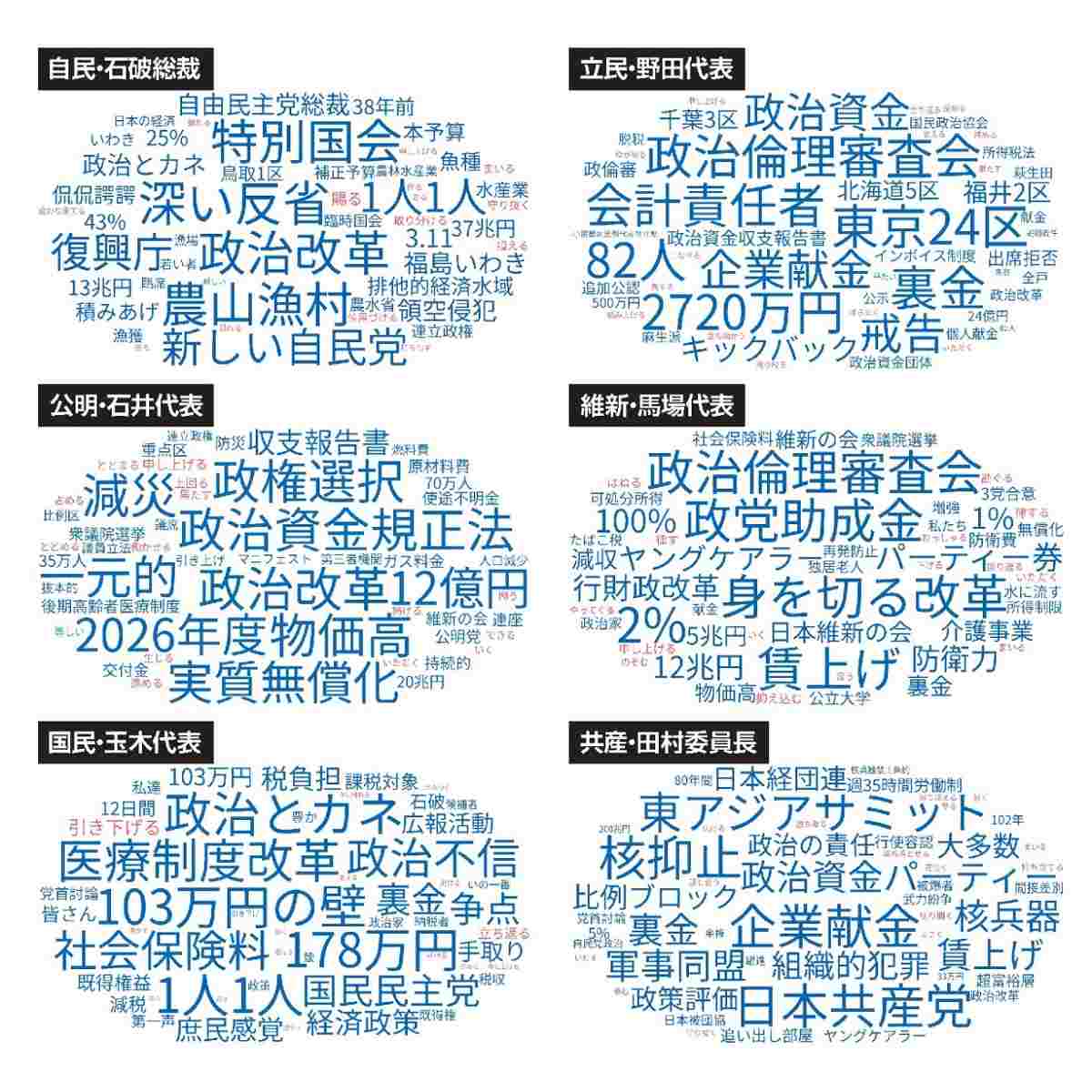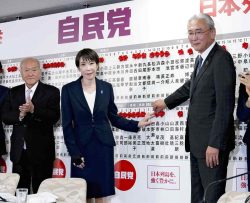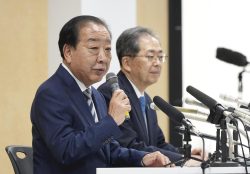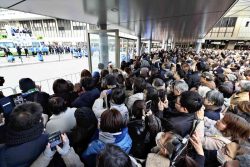
World clouds generated by AI analysis based on the frequency words and phrases were used in a party leader’s speech.
1:00 JST, October 17, 2024
The issue of politics and money, exemplified by the political funds scandal involving Liberal Democratic Party factions, and measures to deal with rising prices appear to be important themes in the Oct. 27 House of Representatives election, according to an analysis by artificial intelligence of the first speeches by leaders of the six main parties.
The analysis used the so-called AI text mining technology of User Local, Inc., a Tokyo-based company that studies and develops AI systems. The characteristic words and phrases used in party leaders’ speeches were visualized, with more frequently used ones being displayed in larger letters.
According to the analysis, “deep regret” and “a new LDP” featured heavily in a speech delivered by Prime Minister Shigeru Ishiba, who is also LDP president.
He mentioned both of these phrases four times in his 20-minute speech, underlining his determination to never allow the issue of politics and money to be repeated.
Ishiba gave his first speech in Fukushima Prefecture and therefore touched on the issue of reconstruction. Regarding intrusions into Japanese waters and airspace by China and Russia, he said: “We’ll protect Japan’s independence and peace by any means … There is no other government that can steer Japan other than the coalition of LDP and Komeito.”
Yoshihiko Noda, leader of the main opposition Constitutional Democratic Party of Japan, frequently used the phrase “hidden funds.” He mentioned that senior members of the CDPJ were chosen to give speeches in the constituencies former LDP members who had been involved in political funds scandals were running in. Noda gave his first speech in Tokyo Constituency No. 24, the home turf of former LDP Policy Research Council Chairman Koichi Hagiuda. “Let’s break down the LDP’s backroom political culture,” he said.
Nobuyuki Baba, leader of the Japan Innovation Party stressed the need for “self-sacrificial reforms” and “making the issue of politics and money more transparent” in order to restore trust in politics. He also said that wages should be increased to a level that exceeds the rise in prices, and that the consumption tax rate should be lowered by two percentage points for the time being.
Keiichi Ishii, leader of the LDP’s junior coalition partner Komeito, stressed that the upcoming election is “an election to choose a government.” He said that the LDP-Komeito coalition government, with its abundant experience and accomplishments, is the only one capable of carrying out measures to deal with high prices and improve disaster resilience and mitigation. “The opposition parties do not have the ability to run the government,” he added.
Regarding political reform, Ishii called for the abolition of the political activity funds that parties provide to their lawmakers, as well as the establishment of a third-party body to monitor political funds.
Tomoko Tamura, leader of the Japanese Communist Party, criticized the LDP for endorsing its former lawmakers who failed to record their income in political funds reports, saying, “How are we supposed to believe the prime minister’s words?” She called for “real political reform” through measures such as banning corporate and organizational donations and abolishing subsidies to political parties.
Democratic Party for the People leader Yuichiro Tamaki said that he would “put an end to the issues of politics and money and kickbacks.” He expressed his willingness to review the “income walls,” where the amount of take-home pay is reduced once a worker earns a certain amount of income and incurs more tax. He also said that he would “implement specific policies that would allow people to work more and earn more.”
Top Articles in Politics
-

Japan PM Takaichi’s Cabinet Resigns en Masse
-

Sanae Takaichi Elected Prime Minister of Japan; Keeps All Cabinet Appointees from Previous Term
-

Japan’s Govt to Submit Road Map for Growth Strategy in March, PM Takaichi to Announce in Upcoming Policy Speech
-

LDP Wins Historic Landslide Victory
-

LDP Wins Landslide Victory, Secures Single-party Majority; Ruling Coalition with JIP Poised to Secure Over 300 seats (UPDATE 1)
JN ACCESS RANKING
-

Japan PM Takaichi’s Cabinet Resigns en Masse
-

Japan Institute to Use Domestic Commercial Optical Lattice Clock to Set Japan Standard Time
-

Israeli Ambassador to Japan Speaks about Japan’s Role in the Reconstruction of Gaza
-

Man Infected with Measles Reportedly Dined at Restaurant in Tokyo Station
-

Videos Plagiarized, Reposted with False Subtitles Claiming ‘Ryukyu Belongs to China’; Anti-China False Information Also Posted in Japan






















